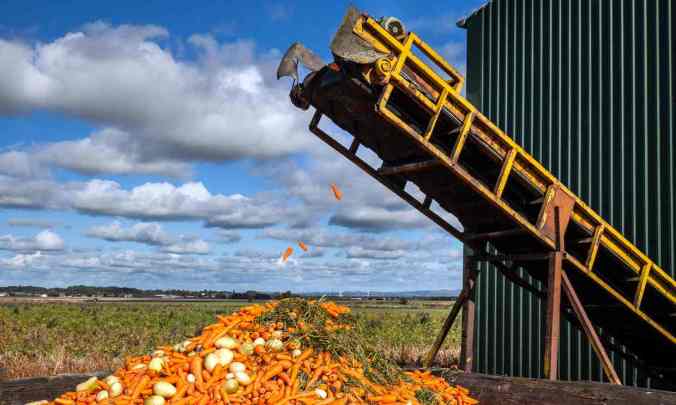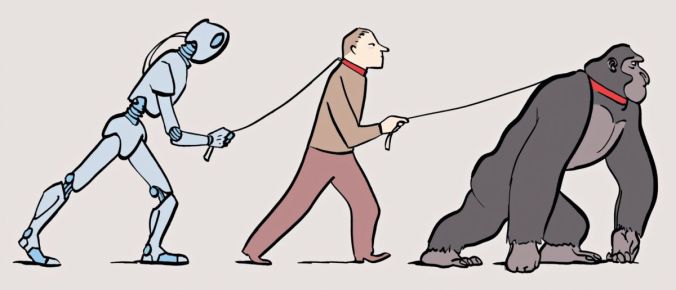Brazil’s plan to roll back environment laws draws fire: ‘The danger is real’
Environmental and indigenous activists condemn plan they say would threaten indigenous territories and make compliance with Paris deal impossible Continue reading
Ethics
Evolution Of Responsibility
Nathan Heller is one of the most consistently engaging, most compelling writers out there, and this new article is one more piece of evidence:
IF ANIMALS HAVE RIGHTS, SHOULD ROBOTS?
We can think of ourselves as an animal’s peer—or its protector. What will robots decide about us?
Harambe, a gorilla, was described as “smart,” “curious,” “courageous,” “magnificent.” But it wasn’t until last spring that Harambe became famous, too. On May 28th, a human boy, also curious and courageous, slipped through a fence at the Cincinnati Zoo and landed in the moat along the habitat that Harambe shared with two other gorillas. People at the fence above made whoops and cries and other noises of alarm. Harambe stood over the boy, as if to shield him from the hubbub, and then, grabbing one of his ankles, dragged him through the water like a doll across a playroom floor. For a moment, he took the child delicately by the waist and propped him on his legs, in a correct human stance. Then, as the whooping continued, he knocked the boy forward again, and dragged him halfway through the moat.
Harambe was a seventeen-year-old silverback, an animal of terrific strength. When zookeepers failed to lure him from the boy, a member of their Dangerous Animal Response Team shot the gorilla dead. The child was hospitalized briefly and released, declared to have no severe injuries. Continue reading
Veggies Punching Above Their Weight

PHOTOGRAPH BY ERIC HELGAS FOR THE NEW YORKER
When scanning the hard news, feature stories, reviews and profiles we are on the lookout for stories that address any of a group of themes, generally related to better treatment of the planet we live on. We are interested in creative approaches to making better human treatment of the natural world more likely, more palatable, so to speak. After reading this article about magnificent results from modest parcels of land cared for by relatively common folk, we see a parallel theme in this restaurant review; it qualifies:
DINING FOR THE MODERN HERBIVORE
“Vegan” evokes two images: judgment for abstemious virtue or scarcity on meat-centric menus. Neither happens at Ladybird.
By Jiayang Fan
…Of some two dozen tapas, the most successful were the least expected and the most unassuming. The olives and cornichons—perfectly pert, coated in seasoned rice flour and gently fried in chili oil—proved to be the kind of addictive nibblers that make you forget the etiquette of communal dining. Continue reading
Pope Francis says Destroying Environment is a Sin
We don’t have any religious affiliation here on the site, but understand that the Roman Catholic Pope has a tremendous influence in the world given his position. Any stance that he takes to protect the environment through denouncing pollution and agents of climate change is a good one in our book regardless of the church or theological basis. Josephine McKenna reports:
Pope Francis has called for urgent action to stop climate change and proposed that caring for the environment be added to traditional Christian works of mercy such as feeding the hungry and visiting the sick.
In a message to mark the Catholic church’s World Day of Prayer for the Care of Creation that he launched last year, Francis said the worst impact of global warming was being felt by those who were least responsible for it – refugees and the poor.
Guilt In The Eye Of The Beholder
A few days back I was struck by a post on this site about lab-grown foods, and wanted to continue the thought exercise by sharing a few comments on a brief article I had just read elsewhere on the intersection between performance art and food issues. Two more cents to add here, by way of a few excerpts from this fascinating, if alarming, article:
Eschewing a Vegan Lifestyle at Home, but Still Embracing It at Work
Who Will Regulate Lab-grown Meat and Milk?
Like most people, we hold reservations about the idea of putting meat, milk, and egg whites made from laboratory cellular agriculture on the market. Will the proteins be safe for humans to consume? Might there be some unforeseen environmental impact even worse than that of raising cattle where rainforests once stood? Are there ethical considerations that outweigh the hope of freeing the chickens that are kept in cages their whole lives just to harvest their eggs?
We don’t have any answers, but are learning more about the whole process this week from Elizabeth Devitt at Science Magazine, where she writes about the fledgling industry and its potential regulators:
The first hamburger cooked with labmade meat didn’t get rave reviews for taste. But the test tube burger, rolled out to the press in 2013, has helped put a spotlight on the question of how the U.S. government will regulate the emerging field of cellular agriculture, which uses biotechnology instead of animals to make products such as meat, milk, and egg whites.
“Bye Bye” to Dolphin Selfies

Dolphins are one of the most adored aquatic mammals due to their charismatic and friendly nature. In Hawaii, spinner dolphins attract thousands of tourists to the island every year, but the lack of regulation on human interaction with these social creatures is changing their behavior and disrupting their sleep cycle:
Spinner dolphins are nocturnal, foraging in the deep ocean at night and returning to shallow waters to rest during the day, said Susan Pultz, the chief of conservation planning and rule-making for the National Marine Fisheries Service.
“When you get the numbers [of tourists] we’re seeing, they’re constantly disturbed all day long. That’s their resting period,” said Pultz.
“As we all know, if you don’t rest day after day after day, it does affect your fitness.”
Food Waste, Remarkably Grotesque

Discarded food is the biggest single component of US landfill and incinerators, according to the Environmental Protection Agency. Photograph: Alamy
We have known for some time the problem is serious, and we are always looking for counter-balancing stories that also highlight solutions. And we are constantly learning more details on just how serious the problem is getting; in short, worse rather than better. Now, new words come to mind. Grotesque is probably the most appropriate (thanks to the Guardian’s ongoing attention to this problem):
The demand for ‘perfect’ fruit and veg means much is discarded, damaging the climate and leaving people hungry
Americans throw away almost as much food as they eat because of a “cult of perfection”, deepening hunger and poverty, and inflicting a heavy toll on the environment.
Vast quantities of fresh produce grown in the US are left in the field to rot, fed to livestock or hauled directly from the field to landfill, because of unrealistic and unyielding cosmetic standards, according to official data and interviews with dozens of farmers, packers, truckers, researchers, campaigners and government officials.
Can You Top This?

Kamilla Seidler, center, who has worked in some of Europe’s top restaurants, leads the kitchen at Gustu, which is both a restaurant and an experiment in social uplift. PHOTOGRAPH BY BENJAMIN LOWY / GETTY IMAGES REPORTAGE FOR THE NEW YORKER
What were we thinking? Yesterday we chose a favorite without considering all the evidence. We stand corrected. Here we have a story of a restaurant at the top of the world, and at the pinnacle of how the game is played today, it sounds like. The content of this story is as superb as it is well written, and the theme is much closer to our hearts with regard to our organization’s core values and social enterprise roots:
Letter from La Paz APRIL 4, 2016 ISSUE
The Tasting-Menu Initiative
Can a restaurant for the rich benefit the poor?
BY CAROLYN KORMANN
Look out the windows of Gustu, the most ambitious restaurant in La Paz, Bolivia, and you’ll see the city climbing up toward the looming peaks of the Andes in a lumpy, shimmering mosaic. Continue reading
Conservation, Technology & Ethics
We have had the good fortune, and could not agree more with the questions raised and the puzzles presented in this opinion editorial published two days ago in the New York Times:
The Unnatural Kingdom
If technology helps us save the wilderness,
will the wilderness still be wild?By
IF you ever have the good fortune to see a Sierra Nevada bighorn sheep, the experience might go like this: On a sunny morning in Yosemite National Park, you walk through alpine meadows and then up a ridge to the summit of Mount Gibbs at 12,764 feet above sea level. You unwrap a chocolate bar amid breathtaking views of mountain and desert and then you notice movement below. Continue reading
Defining A Word We All Use Constantly, And Are Concerned About
Thanks to one of the great writers on food-related ethical issues for getting us to think about a core definition for our everyday vocabulary, including taken-for-granted words like this one:
Why ‘Natural’ Doesn’t Mean Anything Anymore
By
It isn’t every day that the definition of a common English word that is ubiquitous in common parlance is challenged in federal court, but that is precisely what has happened with the word “natural.” During the past few years, some 200 class-action suits have been filed against food manufacturers, charging them with misuse of the adjective in marketing such edible oxymorons as “natural” Cheetos Puffs, “all-natural” Sun Chips, “all-natural” Naked Juice, “100 percent all-natural” Tyson chicken nuggets and so forth. The plaintiffs argue that many of these products contain ingredients — high-fructose corn syrup, artificial flavors and colorings, chemical preservatives and genetically modified organisms — that the typical consumer wouldn’t think of as “natural.” Continue reading
Muro de las Lágrimas: Historical Conservation in the Galapagos
I am currently on study abroad in Ecuador, which has provided me with a mountain of experiences to post about when my homework will allow. I recently had the good fortune to go to the Galapagos, a dream I’ve had since I realized they existed. I am still so struck by everything I saw. In this post, I’ll just highlight one of the places on Isla Isabela that started some good conversations among my classmates about historical conservation of sites of trauma. Also, I will share a poem I wrote about the location.
Former President Ibarra of Ecuador used the island of Isabela as a penal colony (1946-1956), where prisoners were forced to do agricultural labor. They had to carry lava rocks from all over the island to construct the walls of their own prison. There are stories that they would cry as they carried the rocks. I was told that bodies are inside the walls from the rocks falling down while they were building them. The saying that accompanies the island’s history is: Los valientes lloran y los cobardes mueren, which means “The brave cry and the cowards die.” After ten years, the prisoners escaped by creating a play for the guards about prisoners escaping. They got the guards drunk, and actually escaped during the play.
Despite the story of escape, it couldn’t feel like a happy ending. My friends and I were talking about how it felt to visit this site of trauma as tourists. What is the role of historians and purpose of preserving places exactly as they were in the past? Is it to empower us with memories that in our normal lives we couldn’t have access to? Who are these memories for? For some people, this type of oppression is not of the past. They don’t need external reminders because the struggle for survival is part of their daily lives. There was conversation in the group about how preserving sites of trauma allows many of us to experience a sense of empathy before moving on to our daily, more privileged lives. This is how the set-up of touring through the site of trauma left us feeling. Continue reading
Illegal Wildlife Trade, Quantified
The Guardian’s coverage of one of our least favorite but critically important topics is appreciated, as always:
Wildlife crime study finds 33,000 items worth £7m for sale online
Biggest ever survey in 16 countries finds adverts for live tigers, orangutans and chimps – plus a ‘toilet-trained’ gorillaThe world’s endangered wildlife is for sale on the world wide web: live tigers, bears, orangutans and chimpanzees are all just a few clicks away. For those seeking a more manageable purchase, there are emerald boas, hummingbirds or poison dart frogs available by the dozen.
Breakthroughs In Nutrition Via Entrepreneurial Conservation

Exo’s peanut butter-and-jelly bar contains about 40 ground-up crickets and has a familiar nutty, sweet flavor. Meredith Rizzo/NPR
Thanks to National Public Radio (USA)’s food-focused program, The Salt, for another story on unexpected breakthroughs in nutrition:
…”Insects are probably the most sustainable form of protein we have on Earth,” Bitty Foods founder Megan Miller, who spoke passionately about eating bugs at a TEDx Manhattan event earlier this year, tells The Salt. “The only real barrier to Americans eating insects is a cultural taboo.” Continue reading
Yesterday’s Best Half Hour Melted Into Today’s

A pair of Harvard alumni on campus for commencement, in 1977. CREDIT PHOTOGRAPH BY CONSTANTINE MANOS/MAGNUM.
Just after this post had been published yesterday, starting with the acknowledgement of busy-ness and concluding that education plays a key, if mysterious role in character-building and communication capabilities, a kind of echo reverberated through the reading of this post by Joshua Rothman:
There’s a special joy in giving someone advice that’s sure not to be followed—“Wake up at the same time every morning”; “Don’t check your e-mail while on vacation”—and William Deresiewicz must have felt it when writing his recent cover story for The New Republic, “Don’t Send Your Kid to the Ivy League.” Hypercompetitive colleges, Deresiewicz wrote, Continue reading
The Best Half Hour Of The Day
 Busy, busy. Not always enough time to read books even by authors we know to be gifted explainers of complicated, important phenomena. Back around the date this book was published, its author gave an interview. In just over half an hour he managed to explain one of the most complicated human activities imaginable, in terms most of us could understand:
Busy, busy. Not always enough time to read books even by authors we know to be gifted explainers of complicated, important phenomena. Back around the date this book was published, its author gave an interview. In just over half an hour he managed to explain one of the most complicated human activities imaginable, in terms most of us could understand:
“The stock market is rigged,” Michael Lewis tells Fresh Air‘s Terry Gross. “It’s rigged for the benefit for really a handful of insiders. It’s rigged to … maximize the take of Wall Street, of banks, the exchanges and the high-frequency traders at the expense of ordinary investors.”
A Sophie’s Choice Moment For Two Species, One Environment, And No Solomon In Sight

Damian Mulinix — Chinook Observer. A small portion of the cormorant colony as seen from a bird blind.
You can read about this in a major media outlet, but try another approach for this story. Local journalism is alive and well, and covering complex, important topics through the local lens:
A plan to kill 16,000 double-crested cormorants on East Sand Island has some residents on the North Coast scratching their heads. Although still in the proposal phase, the plan drew many to an open house in Astoria last week to ask questions of the federal agencies involved. “I can’t believe in this day and age we can’t come up with an alternative solution to killing things,” said Tommy Huntington of Cannon Beach. Continue reading
Thank You, General Mills
I came across this article on Grist.com about General Mills’s new action plan to reduce their contribution to climate change. After being called out by Oxfam International, Oxfam says that General Mills will be, “the first major food and beverage company to promise to implement long-term science-based targets to cut emissions.”
With both a mitigation and adaptation plan, I am pretty impressed by this corporations efforts to take responsibility of their role. On the official page of their website describing this policy, they cite the 2014 Intergovernmental Panel on Climate Change (IPCC) Working Group II Summary for Policy Makers, which suggests to me that they have people on their team helping them make really informed decisions grounded in scientific evidence. I appreciate in the report the full acknowledgement of the IPCC’s call to action:
“Science based evidence suggests we must limit the global mean temperature rise to less than 2 degrees Celsius above preindustrial levels in order to avoid permanently altering the atmosphere and negatively impacting the environmental, social and economic systems that sustain us – both today and in the future.”
I haven’t seen a big corporation like this that would normally be considered a “dirty business” so blatantly speak to the environmental reality we face. To see a corporation cite this gives me hope that mainstream conversations around climate change are moving towards what we can do and away from whether or not its real. I hope more corporations follow their lead just for the sake of drumming the beat of awareness.
The true colors of this policy will show in how effectively it is implemented, because that will determine whether it is a fluffy ‘greenwashing’ tactic with loopholes built in.
Here are a few of the main points of the policy:
- Set global targets and track progress related to reductions in GHG emissions, energy, water, transportation, packaging and solid waste.
- Support the Innovation Center for U.S. Dairy commitment to reduce fluid milk GHG emissions by 25 percent by 2020. Work with smallholder and conventional farmers to strengthen globally sustainable farming practices.
- Address GHG emissions due to land use change through sustainable sourcing efforts in key supply chains and growing regions. Our aim is to achieve zero net deforestation in high-risk supply chains by 2020. We will regularly report progress towards the zero net deforestation goal.
- Ensure responsible governance and oversight of all sustainability efforts, including climate mitigation and adaptation. Convene the General Mills Sustainability Governance Committee 3 times per year to review and approve strategies, programs and key investments.
- Report progress against goals – our own as well as those in our broader supply chain – on an annual basis via our Global Responsibility Report, available on the General Mills website
For a more extensive look at the report, click here.
While I raise my eyebrows at some of the vague wording in their initiatives, like “support”, “work with”, and “ensure” that are less concrete objectives, I also see timelines and checkpoints to keep themselves more accountable to this than they had to. I have learned to appreciate initiatives that move in the direction of the ideal, rather than criticizing anything that doesn’t model the most perfect action. While it is good to remain skeptical, I think it is important to acknowledge leadership in the right direction when we see it.
Humanity’s Diet Makes A Difference, Historically As Well As Futuristically

On the timescale of evolutionary history, paleo enthusiasts note, agriculture is a fad. Credit Illustration by Mike Ellis.
Since the early days of this blog we have been hungry consumers of environmental long form journalism, of which Elizabeth Kolbert’s New Yorker chronicles are best-in-category. They are also, frankly, almost always depressing.
Nonetheless, they put humanity into its natural context. This not-at-all-depressing chronicle demonstrates the value of that contextualization well:
The first day I put my family on a Paleolithic diet, I made my kids fried eggs and sausage for breakfast. If they were still hungry, I told them, they could help themselves to more sausage, but they were not allowed to grab a slice of bread, or toast an English muffin, or pour themselves a bowl of cereal.
Following the Paper Trail, Redux
 I have been following the Paper Trail since I got here as an intern and got involved in this social entrepreneurship project Raxa Collective has been working on! There are some types of environmental action that focus on being inherently low-impact from the original design while other methods focus on closing loops from more poor designs that leave good material wasted, such as newspapers. Something is sustainable when it meets the triple bottom line: environmental, economic, and social. RAXA Collective has been meeting this triple bottom line with its newspaper bag initiative! Working with the group, PaperTrails, they have been able to provide a livable income for local people who are unable to get work for whatever reason. They have work based on creating useful bags or envelopes out of recycled newspaper. Paper Trails has been providing bags and envelopes for Raxa Collective’s properties from newspapers and other recycled material. Now, we are taking the newspaper bag initiative to the next level. Continue reading
I have been following the Paper Trail since I got here as an intern and got involved in this social entrepreneurship project Raxa Collective has been working on! There are some types of environmental action that focus on being inherently low-impact from the original design while other methods focus on closing loops from more poor designs that leave good material wasted, such as newspapers. Something is sustainable when it meets the triple bottom line: environmental, economic, and social. RAXA Collective has been meeting this triple bottom line with its newspaper bag initiative! Working with the group, PaperTrails, they have been able to provide a livable income for local people who are unable to get work for whatever reason. They have work based on creating useful bags or envelopes out of recycled newspaper. Paper Trails has been providing bags and envelopes for Raxa Collective’s properties from newspapers and other recycled material. Now, we are taking the newspaper bag initiative to the next level. Continue reading









